#BUCPUA Professor reveals how to land the best job ever

On September 29, more than 250 policymakers and job seekers gathered at the 8th Annual Massachusetts Green Careers Conference, held at the DCU Center in Worcester. BU City Planning and Urban Affairs (BUCPUA) Adjunct Faculty Professor Eugene Benson, JD addressed the entire crowd and also led a smaller breakout session. Benson compelled the audience to pursue the best job ever – municipal conservation agent.
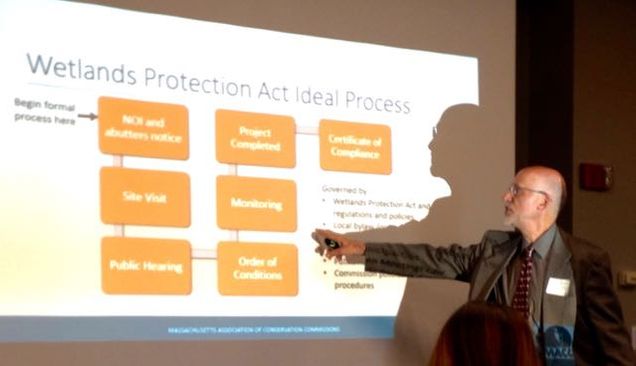
Passionate degree candidates in the #BUCPUA Program assess the social contexts and economic structures that influence the management of fragile open spaces, such as wetlands. The #BUCPUA Program provides students with high-demand tools and pertinent skills to excel as environmental planners. Relevant course offerings include UA 521 Environmental Law, UA 617 Applied Sustainability, UA 654 Geographic Information Systems for Planners, and UA 629 Urbanization and the Environment. Students can complement their Master of City Planning or Master of Urban Affairs degree with a Certificate of Applied Sustainability.
Aside from teaching law to #BUCPUA students, Benson is the Executive Director of the Massachusetts Association of Conversation Commissions (MACC). MACC’s tenants include advocacy, education, and conservation, and the state leader in providing education and training to more than 2,500 conservation commissioners. Benson urged participants to fully grasp the wetlands crisis in the United States, as half the country’s wetlands have disappeared since settlement by Europeans. This loss of wetlands has exacerbated flood conditions, particularly in states like Iowa, which has lost 80 percent of its wetlands. Wetlands perform invaluable functions by buffering floodwaters, capturing carbon, and providing habitats that sustain biodiversity.
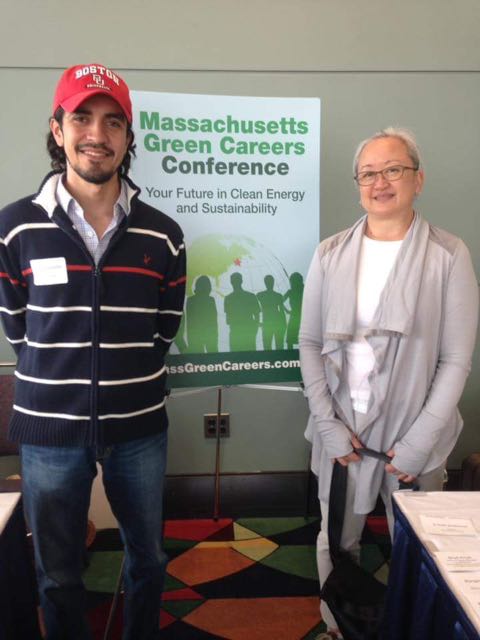
As municipal conservation agents, citizens have a direct stake over the protection and management of these vital, yet vulnerable, areas that envelop land, water, and biological resources. Conservation agents are full-time positions that support and guide all-volunteer municipal conservation commissions. On average, volunteer conservation commissions experience a 10 percent annual turnover, which underscores the value of a municipal conservation agent who can create a stable foundation for long-term planning and land management.
At the state level, the Massachusetts Department of Environmental Protection, the Massachusetts Department of Conservation and Recreation, and Massachusetts Regional Planning Agencies also offer full-time positions that directly influence the protection of open spaces. Qualifications required for state or municipal conservation agent positions include a thorough understanding of environmental law and superb communication skills that conform when influencing different stakeholder groups. Organization skills, creativity, and flexibility also help conservation agents preserve open spaces against myriad external factors, including impacts of climate change and ongoing economic development.
Aside from teaching law in the #BUCPUA Program, Professor Benson also instructs courses at the BU School of Public Health.
New Student Orientation Welcomes Incoming Class of 2022 Virtually with Show-and-Tell Introductions and Breakout Room Activity
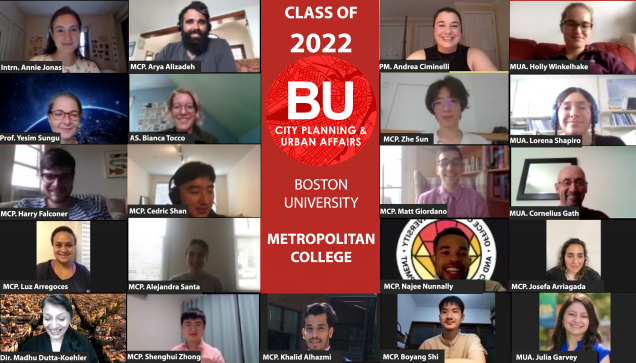
On Wednesday, September 2nd, BUCPUA hosted its New Student Orientation session for its Fall 2020 incoming graduate students. Graduate students came together over Zoom to meet each other and to learn more about their program.
The session was hosted by the Director of the City Planning and Urban Affairs program, Dr. Madhu Dutta-Koehler, and Program Manager, Andrea Ciminelli.
Dr. Dutta-Koehler began the session with a pop quiz: “I want to test your city planning knowledge, if you will. Can anyone tell me what is the city behind me [pointing to her Zoom virtual background]? It’s a very iconic city, with a particular, distinctive type of planning that has inspired many other city forms around the world.”

The city Dr. Dutta-Koehler referred to is Barcelona, a city with a grid pattern that encloses courtyards in perfect squares for as far as the eye can see.
This wasn’t the only interactive lesson during the orientation session.
After going over the agenda for the day and other logistics, the students introduced themselves with a show-and-tell icebreaker activity.
Students were asked to choose an object from their everyday life and share it with the class, explaining why it was important to them. Objects included many cups of coffee, plants (chili peppers and succulents, to be exact), inspirational quotes, and even household pets.
The activity was engaging and timely, especially given the coronavirus pandemic which has relegated many students and professors to virtual or remote learning in their own homes.
As Dr. Dutta-Koehler pointed out, “What is really unique about this moment is that this is the first time where we not only see all of you, but at the same time, this is a way for all of us to share our environments.”
Andrea Ciminelli, the Program Manager for the CPUA, then took over to provide general information, program initiatives, and updates.
The incoming class of fall 2020 includes 50 degree students, 6 certificate students, and 21 faculty members, said Ciminelli. “This is a very diverse program. CPUA is very interdisciplinary. There are students from all kinds of personal, educational, and professional backgrounds which helps enrich the program because there is so much you are going to learn from each other, in addition your faculty members.”
Next, Ciminelli explained the unique circumstances this semester surrounding learning under the COVID-19 pandemic.
The Learn from Anywhere is a flexible model for remote and/or in-person learning created by Boston University. Students can decide whether they will take classes in-person on campus or remotely (students can also choose to switch to or from either mode at any time during the semester). Classes will be held in real time, with students participating in class either in-person or virtually through Zoom. Graduate students attending in-person classes are required to get tested for COVID-19 once a week. More information about classes, testing, and other university protocol about COVID-19 can be found on the Back2BU website.
Graduate students in the CPUA program are also encouraged to stay up-to-date on program happenings with the CPUA Program Blackboard course. The Blackboard course will include program information, important forms, and a place for students to ask questions.
The orientation session came to a close with a group class picture (in this case, a screenshot of the Zoom screen) and a breakout room activity. Students were paired up in small groups to solve a hypothetical urban planning problem.
The breakout room activity prompt was: You and your group mates have been asked to quarantine in the 2-room Community Center of your neighborhood. Though there is ample supply of basic food and water for the time-being, the group can only take 5 objects with them during isolation. What 5 items would your group choose to take during this indefinite quarantine period that will be potentially useful for survival of all members of the group?
Among the already innovative thinking, some of the more unique five objects students brainstormed were: an arts and crafts box, a kit of spices, exercise equipment, flora and fauna, and a tent for isolation.
While this year will certainly look different than years prior, the CPUA program is excited to welcome such a creative and talented group of graduate students to the program.
Anne Jonas, CAS ‘21
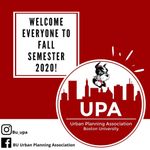
The 2020-2021 UPA Executive Board Shares Their Hopes for an Uncertain Year
The Urban Planning Association (UPA) is the official student club of the City Planning and Urban Affairs Program at Boston University’s Metropolitan College. Each year, the Association holds events on learning, service, and networking to foster a sense of community and togetherness among students, faculty, and alumni.
Building a sense of community and togetherness is more important than ever this year, given the COVID-19 pandemic and the challenges it has brought forward, namely remote work and learning, and separation from friends, family, and colleagues. We asked the Executive Board some questions about their hopes and hardships for the upcoming year.
Question to UPA Executive Board: What are you most looking forward to this academic year and what impact do you hope the UPA makes in the City Planning and Urban Affairs Program this year?
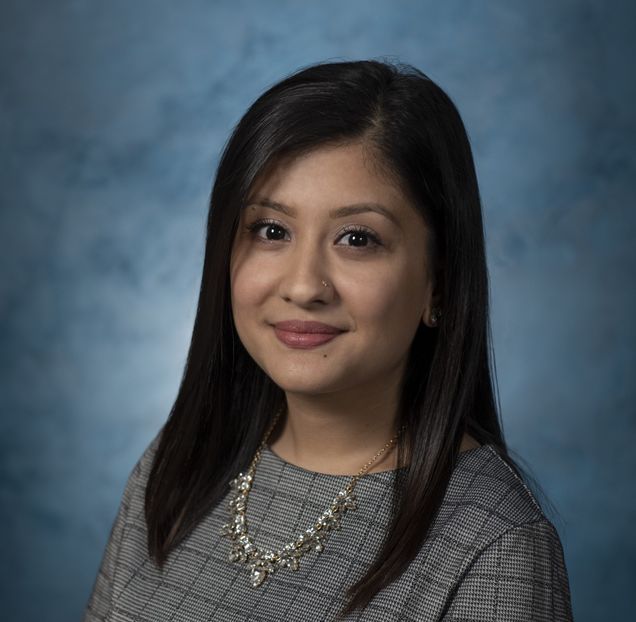
“As this year has been truly unconventional and despite the current challenges, I am looking forward to participating in an array of academic workshops and as a member of UPA, building a close-knitted community within the CPUA program. This academic year, the UPA hopes to create a community that is diverse and inclusive for all students. We would like to increase awareness of the CPUA program, create equitable resources for students to succeed academically, and provide opportunities for professional development.”
Ashiyana currently works as a Sales Associate for Cronin Development/The St. Regis Residences in Boston. She is responsible for day-to-day oversight of collecting, analyzing, and summarizing sales and marketing reports, assisting in the execution of purchases and sales agreements, event planning and contribution in production of marketing materials. Born in Nepal and raised in Cambridge, MA, she enjoys traveling and volunteering. Ashiyana is a Master of Urban Affairs candidate with a focus on community development, policy planning, sustainability, and urban design.

“We're looking forward to being a resource to the students in the program and fostering a lasting community as we confront the educational challenges presented by Covid-19.”
Arya is a second year master’s student in the Master of City Planning (MCP) program at BU. He is a native of Boston and completed his bachelor’s degree at Wesleyan University. He has previously worked in politics and energy. His studies concentrate on urban design and transportation, with a focus on airports and adaptive reuse. Beyond the campus, Arya is an avid skier and woodworker. He also enjoys travel and photography.

“This academic year is going to look and feel like none other. I am looking forward to the UPA creating a positive sense of community and stress relief in a time of a lot of uncertainty. Many people have been socially distancing for quite some time now, and I think the UPA is a group that will be able to bring our City Planning and Urban Affairs program together, both physically and virtually during this upcoming academic year. I mostly look forward to sharing my personal and professional experiences and talking and listening to those who also have knowledge and ideas to share.”
David works as a Transportation Planner at the Cape Cod Commission where he oversees the Cape Cod Traffic Counting Program and the Unified Planning Work Program. He has conducted a Master Bicycle and Pedestrian plan for the Town of Chatham, assisted with outreach and preparation of the Regional Transportation Plan, and managed the creation of the Cape Cod Crash Dashboard. David holds a BA in Regional Planning from Westfield State University and is a master’s candidate in the MUA program. His research interests include transportation equity, alternative modes of travel, and public engagement best practices. Now living on beautiful Cape Cod, David enjoys coaching and playing ice hockey, rollerblading on the Cape Cod Rail Trail, and spending time on the water.

“What I am looking forward to this year is to find the right balance between the damage experienced due to the Pandemic and the new ways to go through this academic year, with the hope of experiencing again the vibrancy that Boston University represents. I hope that the UPA as an organization can support current and future students in achieving their goals and help them make stronger ties with the City Planning and Urban Affairs Program.”
Alejandra received her bachelor’s degree in Political Science from Eafit University in Medellín, Colombia. While pursuing her bachelor's, she interned at the Colombian Consulate in the City of Boston where she discovered her passion for public service. Her primary interests lie in community development, urban design, open space, and access to public parks. Alejandra is currently pursuing a Master in City Planning with a focus on Urban Policy at Boston University’s Metropolitan College.

“I hope the UPA can be a vehicle of cohesion that binds students, teachers, and staff together. I think there is a strong sense of community in our program, with UPA, we have made it stronger. The pandemic this year certainly poses challenges to our community, as most academic and professional networking experiences are moving online. This means that the burden on UPA members to respond to this challenge becomes even heavier.”
Cedric is currently a full-time Master of City Planning candidate with a focus in transportation/housing policy, urban economics, as well as spatial data analysis and storytelling. Cedric works as a video producer with Currin Media, telling visual stories on social issues, and as a research volunteer with Professor Michael Harsch at Boston University on a book project on local statebuilding in fragile countries. He has worked in public transportation, international marketing, and media production. Prior to moving to Boston, Cedric has worked as a production analyst under CRRC Group (industry leader in producing high speed rail and public transportation systems), and as an overseas marketing representative for Cradlechem Technology (a regional pharmaceutical company in China). Cedric is a photography lover that also enjoys soccer, travel, and live music. He holds a Bachelor of Arts in Political Science and Global Studies from University of Minnesota.

“I am personally looking forward to discussing with my professors and peers the pandemic and seeing first hand how urban planning can adapt to a more pandemic-ally aware society. I am also looking forward to helping connect the students here at BU during these life-altering times. My hopes for this year are to facilitate a better relationship with the MetroBridge program and open up avenues for more student engagement with this amazing partnership initiative.”
Corey is a candidate in the Master of City Planning program and Applied Sustainability certificate program. Corey received his Bachelor of Science degree in Industrial Technology from Fitchburg State in 2017, as well as earning the designation as a Commonwealth of Massachusetts Honors Scholar. Corey’s interest within the field of city and urban planning developed in his undergraduate capstone when researching refugee camps and their structure in Turkey. Corey is primarily interested in studying the augmentation of planning with technological advancements, as well as harms these augmentations can introduce to the environment.
While this upcoming year certainly presents many challenges, members of the UPA are forward-looking. Many see the pandemic as a silver-lining that, despite its drawbacks, encourages problem-solving and innovation in finding new ways to learn, network, and even urban plan itself. As the 2020-2021 academic year begins, the UPA Executive Board is certainly ambitious and eager to build the future they want to see. To stay updated on events and information from the UPA, please visit the CPUA website and follow them on Instagram and Facebook.
Anne Jonas, CAS '21
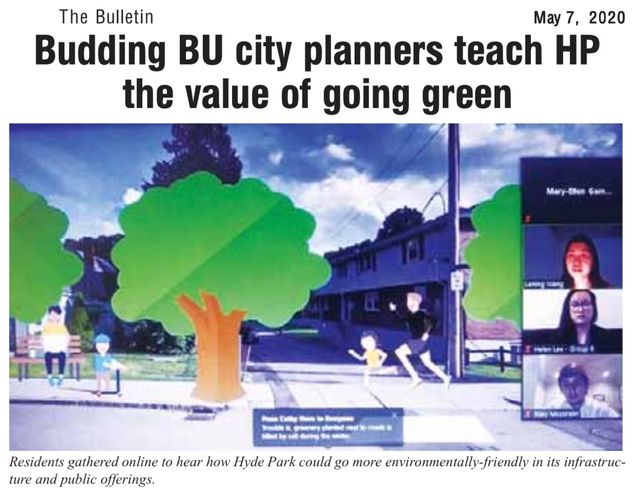
Urban Studies Capstone Proposes Green Opportunities in Hyde Park

By MET Marketing
May 15, 2020
As reported in the Hyde Park Bulletin (Volume 19, Issue 19), on May 5 students from Metropolitan College’s Urban Studies Capstone course (MET UA 805) presented The Power of Green! Strategic Proposals for the Hyde Park Community. The virtual event focused on actions that could be taken to enhance access to, and quality of, the neighborhood’s green spaces, and provoke economic development in the Hyde Park central business district. The four proposals will be made available to the public.
“We want our students to be agents of change,” says Associate Professor of the Practice Madhu C. Dutta-Koehler, director of the City Planning & Urban Affairs programs, and a resident of Hyde Park. “This is a unique neighborhood that needs to be celebrated. Our hope is they will work in the community when they graduate.”
A key course in the Metropolitan College City Planning & Urban Affairs programs, the Urban Studies Capstone is designed to integrate the principles and applications of city planning, urban affairs, and public policy while fostering interdisciplinary partnerships and helping to cultivate industry alliances and cooperation.
Learn more about the Class of 2020 on the City Planning & Urban Affairs website.
Special thanks to fellow Terrier and author of the article, Mary Ellen Gambon (COM’94, CAS’94). Read the full article in the Hyde Park Bulletin.
9 Highly Recommended Titles to Check Out While Social Distancing

If you’ve found yourself desiring more ways to fill your days while social distancing, or just want to learn more during this time; check out these titles below. These titles were recommended by Boston University’s City Planning and Urban Affairs faculty and alumni.
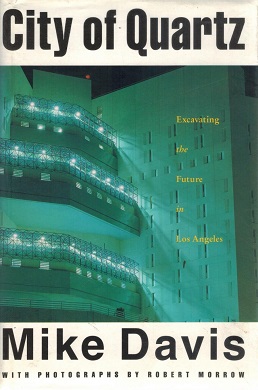
Author: Mike Davis
Author Mike Davis
"The hidden story of L.A. Mike Davis shows us where the city's money comes from and who controls it while also exposing the brutal ongoing struggle between L.A.'s haves and have-nots"

Author: J Anthony Lukas
Common: A Turbulent Decade in the Lives of Three American Families
Author: J Anthony Lukas
"One of the best books ever written about Boston. Common Ground won the Pulitzer Prize for its treatment of Boston's 1970s busing crisis through the lives of African-American, Irish-American, and an upper-middle-class urban pioneer families,"
~Professor James O'Connell
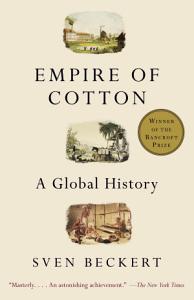
Sven Beckert
Empire of Cotton: A Global History
Author: Sven Beckert
"Beckert is a Harvard professor who has won the Bancroft History Prize. Empire of Cotton is a model for examining how globalization has unfolded. In this case, how the commodity of cotton drove the Industrial Revolution, while promoting American slavery and precipitating the Civil War."
~Professor James O'Connell
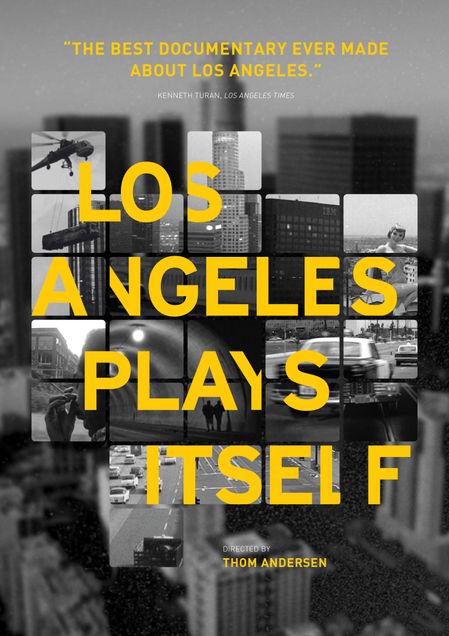
Los Angeles Plays Itself (documentary)
Director: Thom Andersen
Los Angeles Plays Itself (documentary)
Director: Thom Andersen
Documentary displaying how Los Angeles is depicted in film and television

Author: Lizabeth Cohen
Saving America's Cities: Ed Logue and the Struggle to Renew Urban America in the Suburban Age
Author: Lizabeth Cohen
"Harvard's Lizabeth Cohen won the Bancroft Prize as 2020's best book on American History. [The book is] about the career of planner Ed Logue and his experiences in New Haven, Boston, New York State, and the South Bronx in seeking to revive America's declining cities."
~Professor James O'Connell
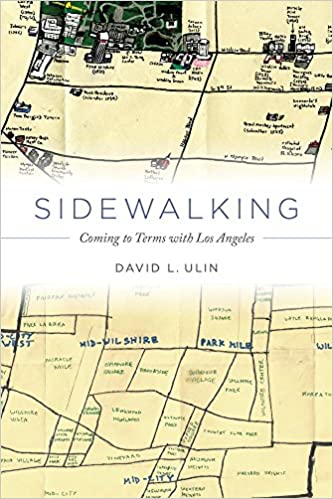
Sidewalking: Coming to Terms with Los Angeles
Author: David Ulin
Sidewalking: Coming to Terms with Los Angeles
Author: David Ulin
"In Sidewalking, David L. Ulin offers a compelling inquiry into the evolving landscape of Los Angeles. Part personal narrative, part investigation of the city as both idea and environment, Sidewalking is many things: a discussion of Los Angeles as urban space, a history of the city’s built environment, a meditation on the author’s relationship to the city, and a rumination on the art of urban walking...."
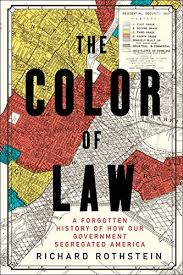
Author: Richard Rothstein
The Color of Law: A Forgotten History of How our Government Segregated America
Author: Richard Rothstein.
"In this groundbreaking history of the modern American metropolis, Richard Rothstein, a leading authority on housing policy, explodes the myth that America’s cities came to be racially divided through de facto segregation—that is, through individual prejudices, income differences, or the actions of private institutions like banks and real estate agencies. Rather, The Color of Law incontrovertibly makes clear that it was de jure segregation—the laws and policy decisions passed by local, state, and federal governments—that actually promoted the discriminatory patterns that continue to this day."
~Professor Eugene Benson

Author: Thomas J. Campanella
The Concrete Dragon: China’s Urban Revolution and What It Means for the World
Author: Thomas J. Campanella,
"The most wide-ranging English-language account of the astonishing development of Chinese cities in recent years. It makes you thirst to learn more."
~Professor James O'Connell
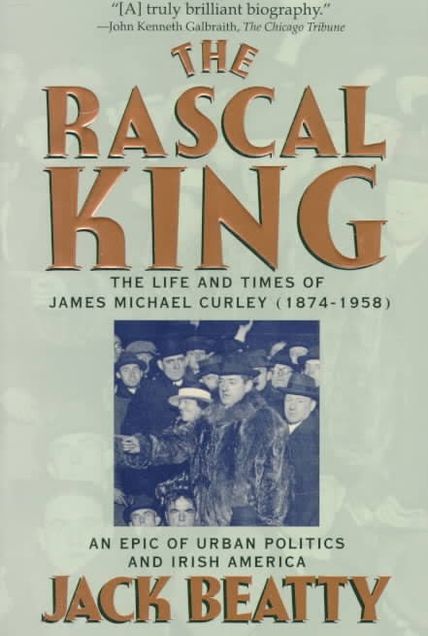
Author: Jack Beatty
The Rascal King: The Life And Times of James Michael Curley
Author: Jack Beatty
"An engrossing tale about the rock 'em-sock 'em Machine-Era politics of Boston in the first half of the 20th century."
~Professor James O'Connell
Imani Roberson (CAS/COM'20)
Urban Studies Capstone Course Holds Panel Discussion With Advisory Board

On February 11th, the Urban Studies Capstone Class (MET UA 805) held a panel discussion with the project advisory board for the course. The discussion included four presentations by Matt Resseger, Eric Halvorsen, Jessica Martinez, and Matt Smith. The presentations discussed research, urban design methods, community engagement, and revitalization programs. Following the presentations, students got the opportunity to ask advisors questions to inform the decision-making process on their projects.
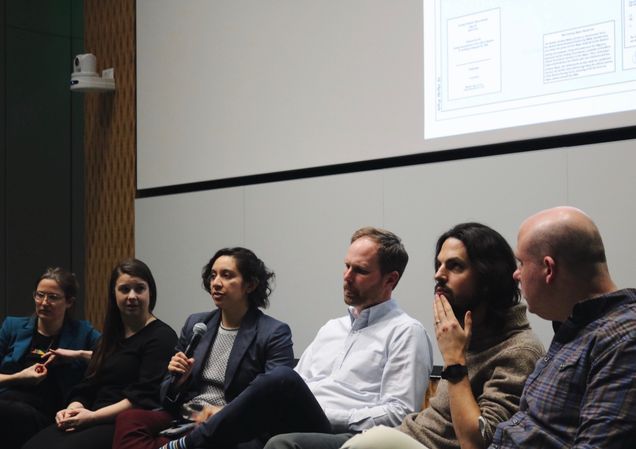
This Spring, the Capstone class is working with the City of Hyde Park on six projects that are either focused on developing green spaces or boosting economic development in the city. The course is co-taught by Professor Madhu Dutta-Koehler, Ph.D. and Matt Smith MCP ‘19, but allows students to get hands-on experience in a non-traditional classroom. During the discussion, the panelists and speakers brought up important information that students were then able to apply to their projects. The projects require intensive research on the City of Hyde Park and the speakers reiterated the importance of this research during their presentations.
“Using data to tell a story is one of the most important things to do as a planner,” said Matthew Resseger.
Additionally, the speakers encouraged students to look to the community to answer many of the questions that they may have about their projects. Considering that the projects are meant to improve the lives of residents, the groups have to focus on what residents actually want.
When asked the question: “How do we create a project applying social and environmental value that can also be justified by its financial value”, the panelists were able to give a variety of insights. Responses varied from working with nonprofits to providing culturally relevant uses. However, Eric Halvorsen offered an insight that’s often overlooked, “Sometimes you don’t need an economic justification. Sometimes you do things solely because there are social and environmental benefits,” Halvorsen said.

The running theme of the night was that urban design is a creative and collaborative process. Developing solutions to the problems faced by many cities requires creativity and innovation. The panelists suggested collaborating with residents, property owners, NGOs, and others to ensure that their projects are as effective as possible. However, it’s even more important that students collaborate with their fellow group members.
Imani Roberson, CAS'20/COM '20
Mayor Walsh Congratulates Metropolitan College Students at 11th Annual City of Boston Scholar Reception

On February 5th, Boston University Metropolitan College and the City of Boston held the 11th Annual City of Boston Scholar Recognition Event. The City of Boston Scholar Program provides graduate scholarship opportunities to City of Boston employees who are taking courses at BU towards master’s degrees and graduate certificates.

Boston Mayor Martin J. Walsh applauded the efforts of city employees who have taken the opportunity to pursue higher education at Boston University.
"Mayor Walsh believes in employees' professional growth and in ensuring all Boston residents can access and complete their post-secondary education," said Winston Pierre, MCP '20, Diversity Programs and Outreach Director for the City of Boston. "The City of Boston Scholarship program is a testament to Mayor Walsh's commitment to that cause. I am proud to be working for an administration that values higher education and makes it a top priority."
The event also featured remarks from Metropolitan College Dean Tanya

Zlateva; Vivian Leondard, Director of Human Resources for the City of Boston; and City of Boston Scholar, Katy Janvier.
Six scholars from the City Planning and Urban Affairs Program were recognized and received rewards.
- Elizabeth Bagley (Master of City Planning)-Boston Transportation Department
- Emily DaSilva (Master of Urban Affairs)- Boston Public Health Commission
- Mollie Hutchings (Master of City Planning)-Department of Public Works
- Winston Pierre (Master of City Planning)-Mayor’s Office of Diversity
- Marco Rebaza (Master of City Planning)- Department of Neighborhood Development
- Rebecca Singh (Master of City Planning)- Public Facilities Department
“In the City of Boston, I think every city employee will echo this sentiment that: we are eternally grateful to the Mayor for believing in us; investing in us so we can all serve and lead with empathy, compassion, and knowledge," said Pierre.
Imani Roberson, CAS '20/COM '20
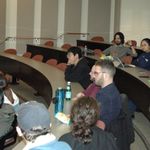
BUCPUA’s Fall 2019 Town Hall — On Vision 2025 and a Growing Program
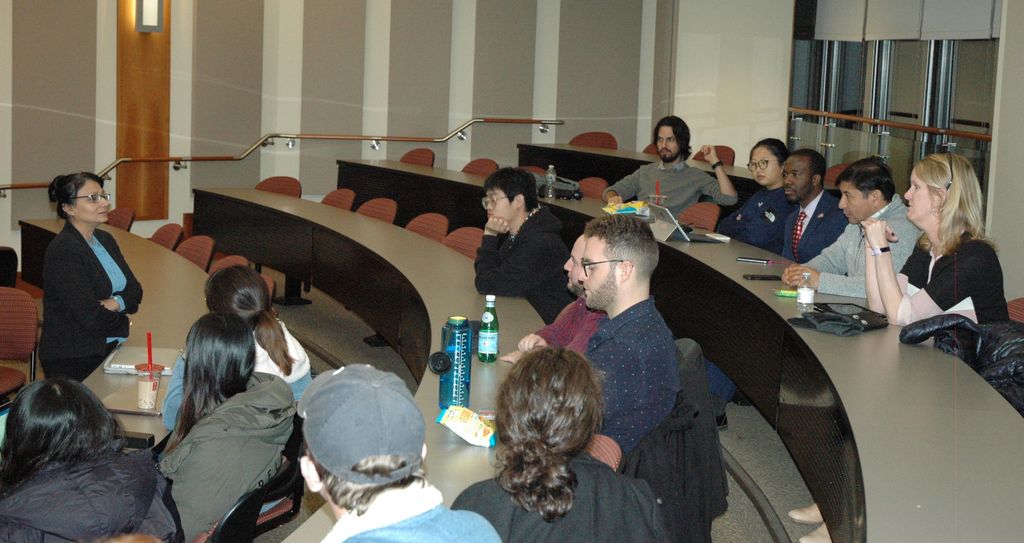
BUCPUA held their annual town hall Thursday evening, November 7, 2019, where students, faculty, and staff discussed where the program is currently at, goals for the future, and initiatives being taken to reach those goals. Dr. Madhu Dutta-Koehler, Professor of the Practice and Program Director, presented on logistics, concerns, and the future of BUCPUA throughout the evening. With an 89% employment rate after graduation, 650+ people in the CPUA community, and a 50% growth rate, Dr. Dutta-Koehler stressed the importance of academic development, increasing enrollment, career services, and alumni networking for the coming years.
BUCPUA will achieve these goals with Vision 2025. Vision 2025 is BUCPUA’s new creative program building effort centered on the E2Pedagogical Model that focuses on both exponential and experiential learning. Courses will encompass more experiential learning where knowledge will link to professional practice, becoming more practical for students with a CPUA degree. Dr. Dutta-Koehler explained how teaching methods must change since “solutions are not what they used to be, therefore we need new ways of thinking and solving problems.”
CPUA will also focus on increasing full-time enrollment and international diversity as well as reaching new heights through program outreaching and — for the first time ever — fundraising. Not only is CPUA looking for the best model to implement for hybrid/online degrees, CPUA is also looking to initiate interdisciplinary graduate degrees and 4+1 programs across BU. There are also steps being taken for CPUA to become a PAB accredited program.
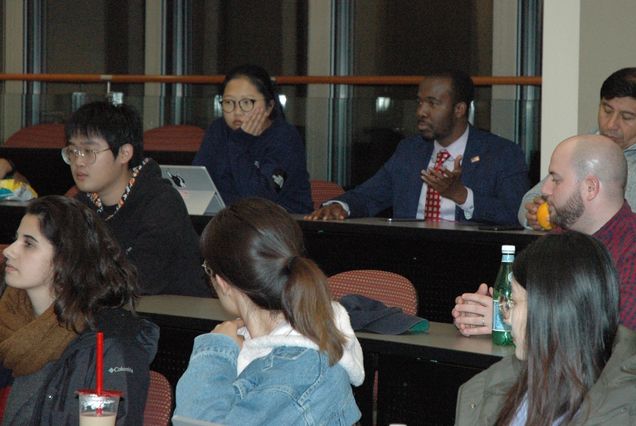
One implementation on the forefront is establishing a Laptop Program which would give students access to subsidized laptops with installed applications to all the software necessary for their planning profession. The idea behind the Laptop Program is that every student would have access to the same technology and platforms, increasing collaboration effectiveness, and allow students to be more equipped for their future career in planning. However, those in attendance for the town hall agreed that it would be best if the program was optional or offered to students in particular classes. Students want the software for themselves, and a recommendation made was for CPUA to hold workshops to setup programs and secure student licenses.
After discussing Vision 2025, Dr. Dutta-Koehler, opened the floor for discussion and feedback on a few topics including events, alumni engagement, and internships. The number of BUCPUA events has increased, yet attendance has decreased, so Dr. Dutta-Koehler posed the question ‘what changes needs to be made?’ A common issue members of the CPUA community had with past events is their timing. Most events are held during class so switching up the timing of events would be helpful, and many audience members suggested the positive reinforcement of class participation for attending program events.
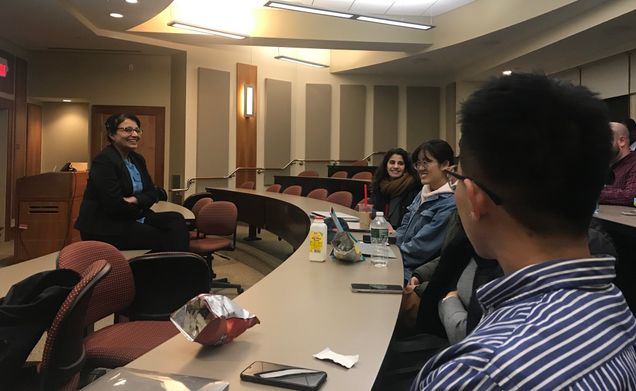
Another hot topic of the night was increasing alumni engagement and how connecting alumni with current students would be beneficial for mentoring and networking opportunities. Suggestions for increasing alumni connectivity included creating events for CPUA members during alumni weekend, introducing UPA Table Talk Sessions, as well as creating a yearly alumni event with a panel and a banquet — which also be paired with the new initiative to fund raise.
The night ended with a conversation on the importance of internship and increasing the number of students who partake in internships. Currently only 36% of students have completed an internship and CPUA would like to increase that percentage due to the valuable experience internships hold. However, it was duly-noted how internships can be expensive for students (since an unpaid internship can equate to the workload of a job) and hard to organize or find. One solution discussed was approaching internships as a self-guided study which equates to class credit. Another solution discussed was creating a project-based internship that is offered as a class where students would work for an employer and check in with a professor, working on a project for a grade.
Overall, BUCPUA’s Fall 2019 Town Hall was a major success. The future of the program was discussed at length, community opinion was gathered, and how positive progress of the program will continue through Vision 2025.
Delanie Fico, CAS '21
BUCPUA Fall 2019 Keynote Lecture — An Insightful Discussion with Former U.S. Rep. Michael Capuano on Community Engagement
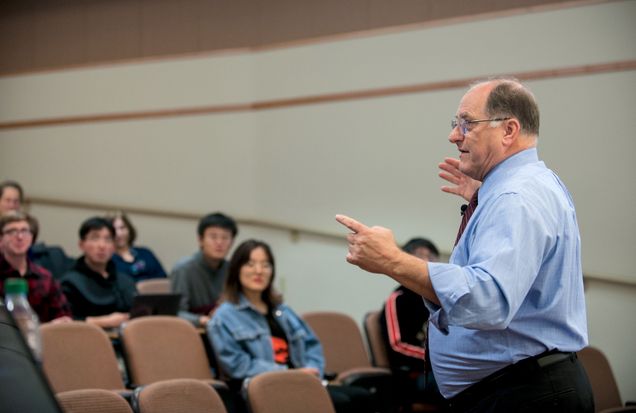
On Wednesday evening, October 16, BUCPUA hosted the Fall 2019 Keynote Lecture with former US Representative Michael Capuano, who spoke on the importance of engaging with communities as planners.
Capuano was the mayor of Somerville for 10 years and spent 20 years in Congress where he had a fiery passion for advocating for urban issues. Brian Creamer, an adjunct faculty member and BUCPUA alum, gave a warm welcome to Capuano, who began the keynote by stating: “This is not a lecture, lectures are boring, sorry professors, I hope [this keynote] is an interaction.”
Capuano opened with the importance of interacting with the people planners are planning for. He posed a question to the audience, “what are you trying to accomplish as planners?” For him, planning is about constructing a better life for multiple different people in many different communities, with many different desires. He then asked the audience, “who are you working for?” As planners, there is a conflict, is the answer an employer or the community?
Capuano grew up in Somerville, a densely populated city with no high-rise buildings, just two and three family homes. Growing up, Capuano felt the effects of outside planners who thought they knew what the community wanted without consulting the community. His discussion on the importance of engaging with communities picked up here.
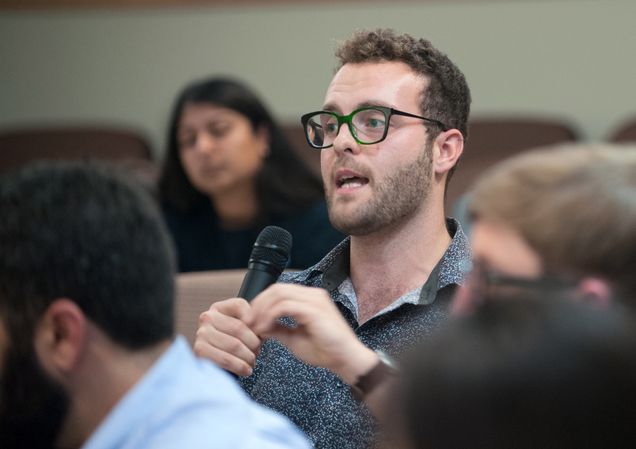
Planners, according to Capuano, have to take everything into consideration before taking action, which includes engaging the community members, asking their opinions, and listening to them. Opinions matter, “go talk to some people,” Capuano stressed. He gave the example of traffic pattern planning, where the planner goes outside and watches what is going on for a few hours, assessing the changes proposed and how they would consequently affect the surrounding areas. Considering the real impacts, not just the impacts a book might state, is a huge part of a planner’s job, and must be taken seriously in order to create a healthy relationship between communities and planners.
Engaging communities before making a decision is vital according to Capuano. Listening to everyone allows for open communication and elevates bad attitudes since the planner no longer is a stranger who wants to change everything without consulting those whose lives the change will affect.
Capuano emphasized that these are conversations that are not regularly held because they are difficult conversations that aren’t straight forward but are extremely important. Opinions should be heard and, if they are not agreed with, respectfully disagreed with, or taken into consideration while planning. For Capuano, honesty is the best policy because respect is driven through honesty about views and plans.
Brian Creamer then opened the floor for questions, where students, faculty, and guests were eager to discuss the topic of engagement. The first question asked was: “What are the most effective ways to generate real engagement?”
“Get up and go talk to people, get out, go knock on a door, it is not that hard,” Capuano answered. There is an importance about offering to hear their voice rather than just sending an email that they may not read. Talk to people before announcements are made so that as a planner, issues can be considered before they arise. “Apply learnings in a way that will help people you are planning for with their opinion in mind.”
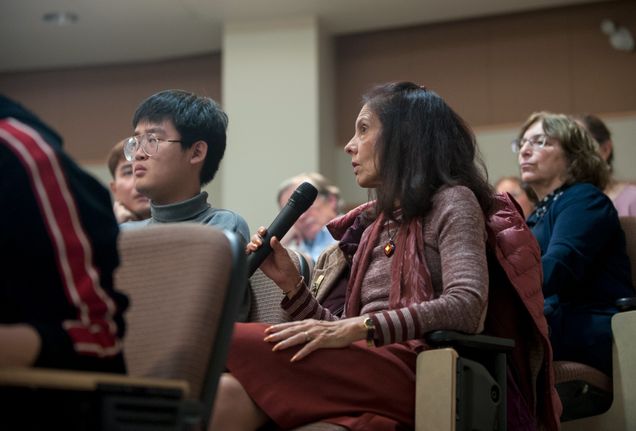
There was a multitude of questions that followed which discussed prominent planning issues and ideas around the Greater Boston area. Topics discussed include the Green Line Extension, the Silver Line history, the push for sustainable living, the importance of condo control, and the growing population of developers in Boston who are invading neighborhoods such as Roxbury, Jamaica Plain, and Allston.
Capuano closed the discussion with the importance of hearing, listening, and either respectfully agreeing or disagreeing with community members: “to not ask generates anger and distrust [among the community].”
The night ended with the audience feeling fulfilled in learning more about how engaging with communities benefits all parties involved in planning and should not be overlooked.
Missed the keynote or want to learn more? Check out the recording on Youtube!
Delanie Fico, CAS '21
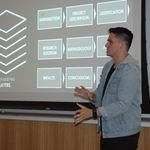
BUCPUA Hosts an Informative Portfolio and Visual Design Session
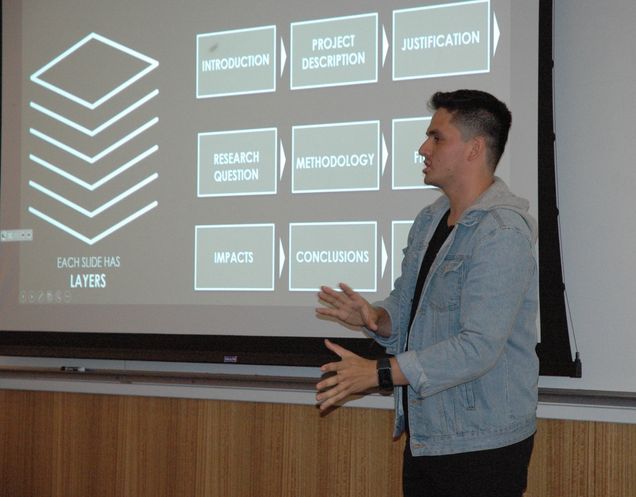
On Monday, October 7th, BUCPUA alum David Valecillos (MCP ‘14), Director of Design at North Shore CDC, and BUCPUA alum Rubén Cerón (MCP ‘19), Design and Placemaking Project Manager at North Shore CDC, hosted a lecture on the key aspects of designing a portfolio and presenting visual projects.
Valecillos discussed the elements which create the best portfolios for planners. He emphasized four key elements: 1. color and text, 2. formatting, 3. general content, 4. portfolio layout. It is important for planners to decide what they professionally want to do and then connect their professional drives to specific companies, tapping into their culture while building a portfolio. Valecillo stressed that simplicity and stylistic choices lead to clean portfolios that affect the reader, and the importance of considering those choices while creating a portfolio.
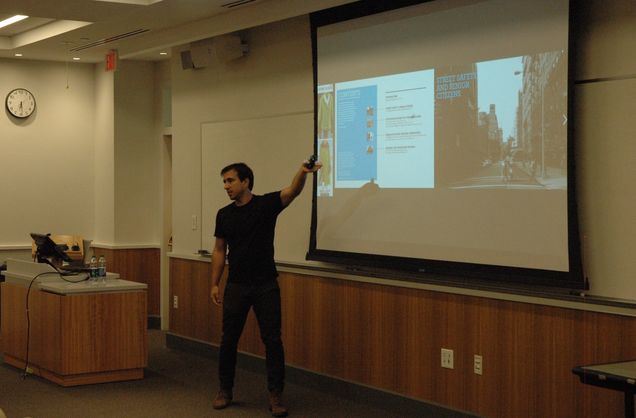
Afterwards, Rubén Cerón took center stage. Cerón presented using PowerPoint, highlighting certain tools the program offers to enhance presentations. Cerón’s presentation itself demonstrated engaging visual representations that planners could use as examples when creating their own presentations. He highlighted how PowerPoint is a way to project and support a planners ideas in a communicable way. A presentation should always include visualization of the planners ideas in maps, graphics, photos, or drawings. Cerón ended his presentation by showing examples of visual data and design for planners.
The lecture was lively with many eager planners waiting to ask questions about their future endeavors into the world of portfolio making and designing presentations. When the evening ended, students had increased fluency in professional communication through design.
Delanie Fico, CAS ‘21
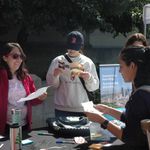
BUCPUA Takes on the Sustainability Festival with a Notable Global Warming Trivia Game and Raffle

On Thursday, September 19th, Boston University’s Marsh Plaza was filled with students, faculty, and organizations promoting sustainable lifestyles at sustainability@BU’s annual Sustainability Festival. CPUA hosted a table -- right next to some delicious smelling kettle corn -- full of free swag, program information, and a fun filled trivia game with prizes!
Manned by multiple students, faculty, and interns of BUCPUA, the table had successful engagement with the BU community and many students asked questions about getting involved with the program. Flyers were being handed out left and right as multiple prospective students found an interest in the graduate and master's programs offered by BUCPUA. There were even a handful of students interested in the new Urban Policy and Planning Graduate Certificate.

The City Planning and Urban Affairs table had continuous momentum with festival-goers as everyone took a shot at winning their choice of BU MET magnets, a BU MET reusable tote, or a BU Sustainability travel mug by participating in an eight question global warming trivia game created by Ben Cares, the UPA President.
Contestants found some questions simple and easy, since they had previously been taught certain facts. One question most contestants seemed to be able to answer right away was “which gas, contributed to the atmosphere by domesticated animals, has sped up global warming?” The answer: methane. Another question which seemed to be common knowledge for most contestants was “which of these causes the greenhouse effect?” The choices were (a) heat from cooking fires of ever-increasing population, (b) excess of nitrogen in the atmosphere, or (c) excess of carbon dioxide in the atmosphere, with choice c being the correct answer. The general consensus was that the question was pretty intuitive for most contestants who had learned about carbon dioxide’s role in the greenhouse effect at a previous time.
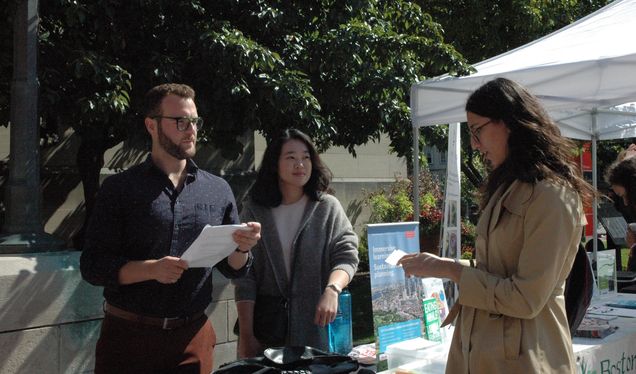
Other questions were not so easy for contestants. The question which confused most contestants was “what percentage of heat from global warming has the ocean absorbed in the last forty years?” The choices were (a) 11%, (b) 35%, (c) 1%, or (d) 84%. Most contestants went with choice b because it seemed to be the most logical -- contestants reasoned that 11%, 1%, and 84% were to extreme to be true. However, it turns out that choice d, 84%, is the correct answer. The fact that 84% of heat from global warming has been absorbed by the ocean in the last forty years shocked most of the contestants who participated in the trivia game.
After participating in the trivia game, students and faculty were entered into a raffle for their chance to win a bag that was made out of recycled tires.
Students and faculty learned more about available programs in the BUCPUA community, walked away with more knowledge about global warming and some awesome BUCPUA swag!
Delanie Fico, CAS '21